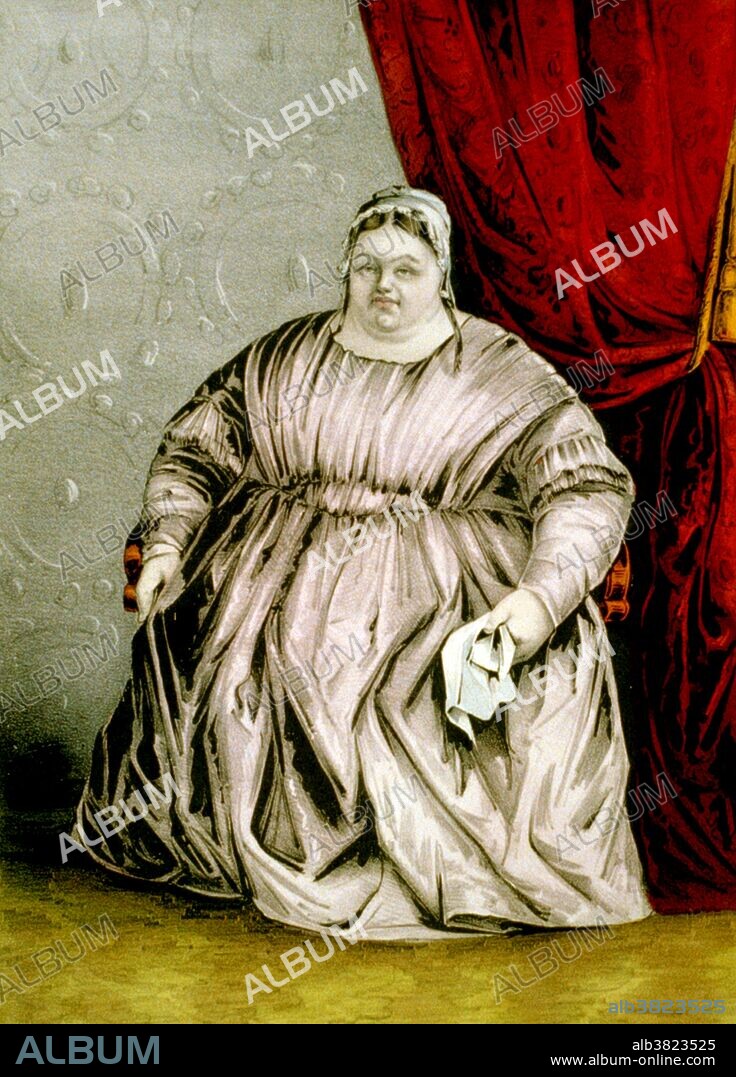alb3823525
Susan Barton, The Mammoth Lady

|
Add to another lightbox |
|
Add to another lightbox |



Title:
Susan Barton, The Mammoth Lady
Caption:
Entitled: "Miss Susan Barton: the mammoth lady, as exhibited at Barnum's American Museum, weight 576 pounds." Ancient Greek medicine recognizes obesity as a medical disorder, and records that the Ancient Egyptians saw it in the same way. Hippocrates wrote that "Corpulence is not only a disease itself, but the harbinger of others". For most of human history mankind struggled with food scarcity. Obesity has thus historically been viewed as a sign of wealth and prosperity. It was common among high officials in Europe in the Middle Ages and the Renaissance as well as in Ancient East Asian civilizations. Many cultures throughout history have viewed obesity as the result of a character flaw. During Christian times the food was viewed as a gateway to the sins of sloth and lust. In modern Western culture, excess weight is often regarded as unattractive, and obesity is commonly associated with various negative stereotypes. People of all ages can face social stigmatization, and may be targeted by bullies or shunned by their peers. Obesity is a medical condition in which excess body fat has accumulated to the extent that it may have a negative effect on health.
Personalities:
Credit:
Album / LOC/Science Source
Releases:
Model: No - Property: No
Rights questions?
Rights questions?
Image size:
3128 x 4350 px | 38.9 MB
Print size:
26.5 x 36.8 cm | 10.4 x 14.5 in (300 dpi)
Keywords:
1840S • 1849 • 19TH CENTURY • AMERICA • AMERICAN • AMUSEMENT • ARTWORK • BARNUM MUSEUM • BARNUM'S AMERICAN MUSEUM • BARNUM • BARTON • CHUBBY • CORPULENCE • CURIOSITY SIDESHOW • CURRIER & IVES • CURRIER AND IVES • DISEASE • DISORDER • DIVERTISSEMENT • DRAWING • ENORMOUS • ENTERTAINER • ENTERTAINMENT • EXCESS BODY FAT • EXCESS WEIGHT • FAT LADY • FAT MAN • FAT PERSON • FAT • FATNESS • FEMALE • FREAK • GORDO • HISTORIC • HISTORICAL • HISTORY • ILLUSTRATION • LITHOGRAPH • MAMMOTH LADY • MEDICAL CONDITION • MEDICAL • MEDICINAL • MEDICINE • MORBID OBESITY • OBÈSE • OBESITY • OVERWEIGHT • P. T. BARNUM • PAUNCH • PERFORMER • PLUMP • PORTLY • ROTUND • SCIENCE • SIDESHOW • SUSAN BARTON • UNHEALTHY • UNITED STATES • US • USA • WELL-ROUNDED FIGURE • WOMAN • WOMEN
 Pinterest
Pinterest Twitter
Twitter Facebook
Facebook Copy link
Copy link Email
Email

